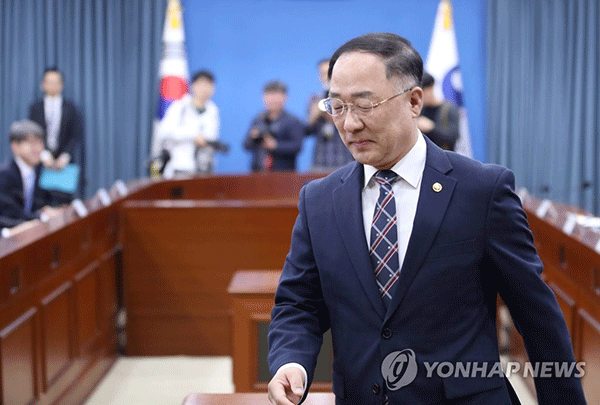South Korea's chief economic policymaker on Wednesday called on the National Assembly to swiftly pass the 6.7 trillion-won (US$5.8 billion) extra budget bill, as Asia's fourth-largest economy is facing downside risks.
"The timing and speed are crucial factors of the extra budget," Hong Nam-ki, the minister of economy and finance, said during a meeting on the revitalization of the national economy.

The remark came after Seoul proposed the extra budget, the third of its kind under the Moon Jae-in administration, late last month to cope with a slowdown in Asia's fourth-largest economy and fine dust that often blankets the country.
Hong earlier said the budget will help boost the country's economic growth by 0.1 percentage point.
South Korea's finance ministry has projected the nation's economy to expand between 2.6 percent and 2.7 percent this year. Last month, the BOK trimmed its economic outlook for the South Korean economy to 2.5 percent from 2.6 percent, citing a sharper than expected slump in exports and facility investment.
As to the Korean won, which has been losing ground against the U.S. dollar amid geopolitical tensions stemming from North Korea's test-firing of projectiles and the deepening trade dispute between the U.S. and China, Hong said the government will continue to keep a watchful eye on the currency market.
"Various factors affected the foreign exchange market, including the trade row between the United States and China and South Korea's slowing exports," Hong said.
Hong said the currency rates should be determined in the market but the government is ready to intervene to curb the one-sided move.
The South Korean won closed at 1,169.40 won against the U.S. dollar on Wednesday, down 2.90 won from the previous session. During the session, the Korean won fell to as low as 1,172.50 won, hitting a fresh two-year low.
The minister also ruled out the possibility of a drastic exodus of foreign capital from South Korea.
Hong stressed that South Korea is reviewing all options to deal with any potential fallout from the ongoing trade dispute between the U.S. and China, the two major overseas export markets for Asia's fourth-largest economy.
Global financial markets have become volatile after U.S. President Donald Trump threatened to raise Washington's tariffs on $200 billion worth of Chinese products to 25 percent from the current 10 percent starting later this week.
"Although we cannot rule out the worst situations, I believe that their negotiations will make progress," Hong said.(Yonhap)

